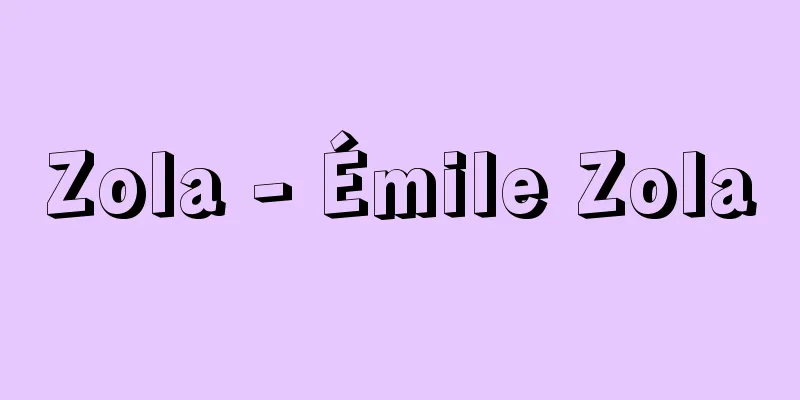Zola - Émile Zola

|
A representative French author of naturalist literature. Born in Paris on April 2nd to an Italian civil engineer father, he spent his childhood in Aix in the south of France. One of his friends from middle school was the painter Cézanne. When Zola was seven years old, his father suddenly died, leaving his family in poverty, so he moved to Paris to attend high school, but failed the baccalauréat (university entrance exam) and abandoned his studies, moving from one backstreet to another while dreaming of becoming a poet. From 1862, he worked at the Hachette bookstore, where he became acquainted with Sainte-Beuve and Taine. From this time on, he began writing book and art reviews, and defended Impressionist painters such as Manet in argument. His ability as a novelist was also recognized with "Comte for Ninon" (1864). He solidified his style with his subsequent work, Thérèse Raquin (1867), and continued to write energetically throughout his life, including the Rougon-Macquart Series (1871-93), Three Cities (1894-96), and The Four Gospels (1899-1902). [Yoko Kudo] The Rougon-Macquart CollectionThe 20-volume series "The Natural and Social History of a Family under the Second Empire" is a masterpiece that rivals Balzac's "La comédie humaine," and tells the story of Adélaïde Fouque, who lives in Plassans, a town thought to be Aix where the author grew up, and the children she has with a farmer named Rougon and then a smuggler named Macquart, and how their descendants branch out into all walks of life, taking up various professions such as farmers, laborers, merchants, prostitutes, painters, priests, and businessmen. Among his works, the most well-known masterpieces are "The Tavern" (1877), which tells the unfortunate life of a washerwoman named Gervaise, and "Nana" (1880), the story of her daughter Anna, who becomes a high-class prostitute. Other well-known works include "Germinal" (1885), in which a miner named Etienne leads a strike, "Composition" (1886), in which a painter named Claude, said to be modelled on Cézanne, commits suicide out of disappointment in his own talent, and "The Beast in Man" (1890), in which an abnormal engineer named Jacques impulsively commits murder. The protagonists of these three works are all set to be sons born to Gervaise. While Balzac primarily depicted the exceptional lives of people driven by strong emotions, Zola showed his true worth as a novelist when he frankly portrayed the lives of ordinary people, especially the lower classes, who had the desire to improve themselves but repeatedly failed and met tragic endings. As a writer who could be said to be the embodiment of scientism and positivism, which reached its peak in Europe in the second half of the 19th century, Zola believed that humans are shaped by their physiological and genetic predispositions as well as their environment. While Balzac was dedicated to creating unique and typical characters, Zola considered it the mission of a novelist to determine how humans, conditioned by their innate physiological characteristics, or temperament (tamperement), behave in a social environment and to describe this objectively. His works such as "Experimental Novel" (1880), which was inspired by Claude Bernard's experimental physiology, and "Of Naturalistic Authors" (1881), in which he discusses Flaubert and other authors whom Zola regarded as pioneers, are developments of this theory of novels. Although the theories themselves cannot be applied to present-day literature, they are worth reading as documents that tell the story of the era that gave birth to Zola's art. While writing novels and working as a critic, he also discussed literature with young writers at his villa in Medan, and published "Evening in Medan" (1880), a collection of short stories by Huysmans and Maupassant, ushering in the golden age of naturalism. However, during this time, Zola's literature was constantly being slandered as vulgar and explicit, and after the publication of "The Earth" (1887), the "Manifesto of the Five" was issued, and even young writers defected from the Medan group. [Yoko Kudo] The Dreyfus Affair and ZolaZola himself gradually became more idealistic and humanitarian, and during the Dreyfus Affair he played an active role as a representative of intellectuals in favor of a retrial, arguing for Dreyfus's innocence. In 1898, he published an open letter to the president entitled "I Condemn You", in the newspaper Aurore. He was charged with insulting high-ranking government officials and the military during the "Zola Trial", and was forced to seek exile in England. After returning to France the following year, he wrote novels, became fascinated with cameras, and published a collection of critiques related to the Dreyfus Affair under the title "The Truth Advances" (1901). He died of carbon monoxide poisoning at his home on the Rue de Bruxelles in Paris on September 29, 1902. There are also theories that he was murdered. Zola, the 19th century's greatest best-selling author, was also an influential critic and intellectual, but his true talent lies in the worlds of his novels, constructed with a rich imagination and outpouring of words. [Yoko Kudo] "Tanabe Sadanosuke's translation of "World Literature Series 46 Zola" (1974, Chikuma Shobo)" ▽ "Shinoda Koichirō's translation of "Thérèse Raquin" (Kodansha Bunko)" ▽ "Yasushi Masao's translation of "Germinal" all 3 volumes (Iwanami Bunko)" [References] | | |Source: Shogakukan Encyclopedia Nipponica About Encyclopedia Nipponica Information | Legend |
|
自然主義文学を代表するフランスの作家。イタリア人の土木技師を父として4月2日パリに生まれ、幼少年期を南仏エクスで過ごす。中学時代の友人に画家セザンヌがいる。ゾラ7歳のとき父が急死し一家は困窮、パリに出て高校に入るが、バカロレア(大学入学資格試験)に失敗し学業を放棄、詩人を夢みつつ裏町を転々とする。1862年よりアシェット書店に勤め、サント・ブーブ、テーヌらと面識を得る。このころから書評、美術評を手がけ、マネら印象派の画家たちを擁護して論陣を張る。また『ニノンに与えるコント』(1864)により小説家としての力量を認められた。続く『テレーズ・ラカン』(1867)で作風を固め、『ルーゴン・マッカール双書』(1871~93)、『三都市』(1894~96)、『四福音(ふくいん)書』(1899~1902)を生涯かけて精力的に書き続けた。 [工藤庸子] 『ルーゴン・マッカール双書』「第二帝政下における一家族の自然的、社会的歴史」の副題がある『ルーゴン・マッカール双書』全20巻は、バルザックの『人間喜劇』の向こうを張る大作で、作者が育った町エクスとおぼしきプラッサンに住むアデライード・フークがルーゴンという農夫、ついで密輸業者マッカールとの間にもうけた子供たちとその子孫が、農民、労働者、商人、娼婦(しょうふ)、画家、司祭、実業家など、さまざまな職業につき、社会のあらゆる階層へ分岐してゆくさまが語られる。なかでも名作の定評があるのは、洗濯女ジェルベーズの不幸な生涯を語る『居酒屋』(1877)と、その娘アンナが高級娼婦となる物語『ナナ』(1880)。さらに炭鉱労働者エティエンヌがストライキを指揮する『ジェルミナール』(1885)、セザンヌがモデルといわれる画家クロードが己の才能に失望して自殺する『制作』(1886)、異常性格の機関士ジャックが衝動的に殺人を犯す『獣人』(1890)もよく知られる。これら三作の主人公たちもすべて、ジェルベーズの産んだ息子という設定である。 バルザックはもっぱら、強烈な情念につき動かされる人間の例外的人生を描いたが、ゾラは、向上の意欲をもちながら挫折(ざせつ)を繰り返し悲劇的な結末をたどる平凡な庶民、とくに下層階級の生活を赤裸々に描くとき、小説家としての真価を発揮した。19世紀後半ヨーロッパで頂点に達した科学主義、実証主義の申し子ともいえる作家で、人間は生理的、遺伝的素質と環境によって形成されると信じていた。バルザックは、個性的、典型的人物をひたすら創造したが、ゾラは、もって生まれた生理的特質、つまり体質(タンペラマン)に条件づけられた人間が、社会環境のなかでいかに行動するかを見極め、これを客観的に記述することが小説家の使命と考えた。クロード・ベルナールの実験生理学に学んだ『実験小説論』(1880)、ゾラが先駆者と仰ぐフロベールらを論じる『自然主義作家論』(1881)などの論著は、こうした小説理論の展開であり、理論自体は今日の文学に適用できないが、ゾラの芸術を生んだ時代を物語る資料として一読に値する。 小説を書き、評論活動に取り組むと同時に、メダンの別荘で若き作家たちと文学を語り合い、ユイスマンス、モーパッサンらの短編を集めた『メダンの夕べ』(1880)を出版、自然主義の黄金時代を築いた。しかしその間にも、ゾラの文学を猥雑(わいざつ)、露骨とする誹謗(ひぼう)中傷は絶えず、『大地』(1887)が刊行されると、「五人宣言」が出され、若手文学者たちまでがメダンのグループから離反した。 [工藤庸子] ドレフュス事件とゾラその後ゾラ自身、しだいに理想主義的、人道主義的傾向を強め、ドレフュス事件では、ドレフュス無罪を主張する再審派知識人の代表として活躍。1898年、大統領にあてた公開状『われ弾劾す』を『オーロール』紙に掲載。さらに「ゾラ裁判」で政府高官、軍部を侮辱した罪に問われ、イギリス亡命を余儀なくされた。翌年帰国後は、小説執筆のかたわら、写真機に熱中し、またドレフュス事件関係の評論を集め『真実は前進する』(1901)と題して刊行。1902年9月29日、パリ、ブリュッセル街の自宅で一酸化炭素中毒のため死去。他殺説もある。19世紀最大のベストセラー作家ゾラは、評論家、知識人としても大きな発言力をもったが、真骨頂は、豊饒(ほうじょう)な想像力とほとばしるようなことばで構築する小説の世界にある。 [工藤庸子] 『田辺貞之助訳『世界文学大系46 ゾラ』(1974・筑摩書房)』▽『篠田浩一郎訳『テレーズ・ラカン』(講談社文庫)』▽『安士正夫訳『ジェルミナール』全3冊(岩波文庫)』 [参照項目] | | |出典 小学館 日本大百科全書(ニッポニカ)日本大百科全書(ニッポニカ)について 情報 | 凡例 |
Recommend
Pseudis paradoxa (English spelling)
For example, the English name of the European tre...
Western paper - Yoshi
It refers to paper that was brought over by sea, ...
Reversible reaction
In chemical reactions, this refers to a type of r...
A-class - Ah, right?
…The cross-sectional shape of soil is shown in Fi...
Eberhard Karl University
…The university was founded in 1477 in Tübingen, ...
Hakuba [village] - Hakuba
A village in Kitaazumi District, northwest of Naga...
Kanikusa (Japanese climbing fern)
A perennial vine fern of the Crabraceae family. I...
Rhodes grass
A perennial grass of the grass family. Native to ...
"The journey of the butterfly Hatsune" - The journey of the butterfly Hatsune
…【Yokomichi Mario】(2) Kabuki dance, Kiyomoto. Ori...
Servo mechanism - servomechanism
Also called a servo control system. A control syst...
Endosymbiotic theory
…This difference must be explained when consideri...
Reparation Problem
In modern Western history, when a dispute between ...
Foreign Currency - Gaikadate
The buying and selling of financial products and i...
Sudarium
…Louis IX, who received the crown of Christ, dedi...
Ramírez, F.
… Research into Mesoamerican culture began with r...









